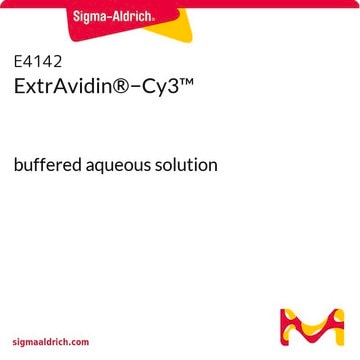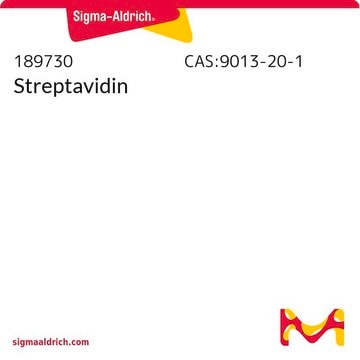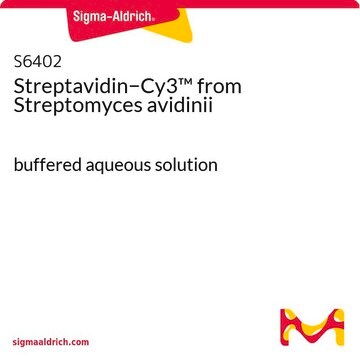E2511
ExtrAvidin®
essentially salt-free, lyophilized powder
Sign Into View Organizational & Contract Pricing
All Photos(1)
About This Item
Recommended Products
form
essentially salt-free, lyophilized powder
Quality Level
technique(s)
dot blot: suitable
immunohistochemistry: suitable
indirect ELISA: suitable
radioimmunoassay: suitable
shipped in
wet ice
storage temp.
2-8°C
Specificity
Binding Activity: at least 10 μg biotin per mg
Application
ExtrAvidin® has been used to tetramerize aliquots to generate HLA-A2 tetramers.
Biochem/physiol Actions
ExtrAvidin® is prepared from egg white avidin. It is a tetrameric protein containing four high affinity binding sites for biotin. It combines the high specific activity of avidin with the low background staining of streptavidin, a biotin binding protein produced by the bacteria Streptomyces avidinii. It binds biotin with the high affinity of egg white avidin, however, it does not exhibit the unwanted non-specific binding reported for egg white avidin at physiological pH, such as the staining of mast cells.
Other Notes
A modified form of affinity purified egg white avidin.
Legal Information
ExtrAvidin is a registered trademark of Merck KGaA, Darmstadt, Germany
Disclaimer
Unless otherwise stated in our catalog or other company documentation accompanying the product(s), our products are intended for research use only and are not to be used for any other purpose, which includes but is not limited to, unauthorized commercial uses, in vitro diagnostic uses, ex vivo or in vivo therapeutic uses or any type of consumption or application to humans or animals.
Storage Class Code
11 - Combustible Solids
WGK
WGK 3
Flash Point(F)
Not applicable
Flash Point(C)
Not applicable
Personal Protective Equipment
dust mask type N95 (US), Eyeshields, Gloves
Choose from one of the most recent versions:
Certificates of Analysis (COA)
Lot/Batch Number
Don't see the Right Version?
If you require a particular version, you can look up a specific certificate by the Lot or Batch number.
Already Own This Product?
Find documentation for the products that you have recently purchased in the Document Library.
Customers Also Viewed
Development of a T-cell Receptor Mimic Antibody against Wild-Type p53 for Cancer Immunotherapy
Li D, et al.
Cancer research, 77(10), 2699-2711 (2017)
Hanwei Gao et al.
Proceedings of the National Academy of Sciences of the United States of America, 105(51), 20146-20151 (2008-12-17)
Surface plasmon polaritons (SPPs) are responsible for exotic optical phenomena, including negative refraction, surface enhanced Raman scattering, and nanoscale focusing of light. Although many materials support SPPs, the choice of metal for most applications has been based on traditional plasmonic
Demin Li et al.
Cancer research, 77(10), 2699-2711 (2017-04-02)
The tumor suppressor p53 is widely dysregulated in cancer and represents an attractive target for immunotherapy. Because of its intracellular localization, p53 is inaccessible to classical therapeutic monoclonal antibodies, an increasingly successful class of anticancer drugs. However, peptides derived from
E O'Connor et al.
Journal of immunological methods, 229(1-2), 155-160 (1999-11-11)
The ability to detect a protein is always limited to the sensitivity of the assays available. Progress in improving the sensitivity of protein detection will allow a more complete understanding of biological systems. Of particular interest to the field of
John E G McCarthy et al.
Methods in enzymology, 430, 247-264 (2007-10-05)
A growing number of biophysical techniques use immobilized reactants for the quantitative study of macromolecular reactions. Examples of such approaches include surface plasmon resonance, atomic force microscopy, total reflection fluorescence microscopy, and others. Some of these methods have already been
Our team of scientists has experience in all areas of research including Life Science, Material Science, Chemical Synthesis, Chromatography, Analytical and many others.
Contact Technical Service












